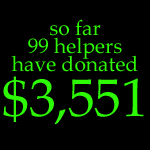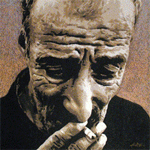World Cup Loaded With Interesting Personalities
 Friday, June 11, 2010 at 10:31AM
Friday, June 11, 2010 at 10:31AM American Keeper Tim Howard
Battles Tourette's Syndrome
By STEVE SUSI
One Great Season
Whether you're a savvy soccer fan with a legitimate rooting interest, or if you pick your World Cup winners based on uniform colors, you're bound to hear a few stories about some of the event's most interesting players over the next month. Before ESPN has a chance to tell them to you next week, keep on reading so you can sound like you're in the know at tomorrow's watch party:
The Boateng Brothers (Kevin-Prince, Ghana; Jerome, Germany)
Half-brothers Jerome and Kevin-Prince Boateng grew up in Berlin as the sons of n Ghanaian immigrant, and in a historic turn of fate could actually end up facing each other in the World Cup on June 23, with one competing for the German side, the other for Ghana.
Jerome Boateng, 21, is a defender for the German national team. His mother is from Berlin, and though he's never actually laid eyes on Ghana, he feels a strong connection to the West African nation. He likes to listen to music from Ghana because it sounds happy, and he even has a few Ghanaian friends.
"But it was clear to me early on that I only wanted to play for Germany," he told Germany’s Der Spiegel in April. Why?
"Because it doesn't make any sense. Germany is my home. I like the people here, and the mentality," Boateng said. "The fact that Kevin made a different choice is his business. But he's my half-brother, and I'm happy for him."
Older half-brother Kevin-Prince Boateng also was born in Berlin and has 13 tattoos, some of which depict the continent of Africa. In official documents his name is just "Kevin," but he likes to go by the name Kevin-Prince to honor his father Prince Boateng.
Kevin-Prince's maternal grandfather is a cousin of German legend Helmut Rahn, who scored the winning goal in the 1954 World Cup. Both brothers' paternal uncle is a former Ghana international.
In contrast to his half-brother Jerome, Kevin-Prince prefers music by German rapper Bushido, whose music is about less-than-savory subjects which can't be discussed here. Most of what he knows about his father's home country comes from stories he's heard. "I'm proud to be an African," he told the paper.
He's officially one now, at least within the definition of a man who plays for an African national team; on May 12, FIFA approved his nationality switch application, just five days after Ghana head coach Milovan Rajevac named the 23-year-old to the 30-member finalist squad of the Black Stars, the nickname for Ghana's national team.
As kids, Jerome and Kevin-Prince played for the same club, Hertha BSC, in both the amateur and pro ranks, and then both left it in 2007. Jerome now plays for Bundesliga power Hamburg SV, though it's evident he wants to move to an English club next season. Kevin-Prince is a step ahead of little brother in that department, as he plies his trade for Portsmouth in England's Premier League.
Their paths are sure to cross again on June 23, when Germany takes on Ghana in Johannesburg's Soccer City Stadium — which would render the Boatengs the first pair of brothers to compete against one another in the history of the World Cup.
Germany v. Ghana will be the final match of Group D, which means there very well might be some incredible pressure on both teams, depending on how their first two Group Play matches pan out. And this won’t be just two guys occupying a field at the same time, i.e., goalkeeper on one side and fullback on the other, never to interact. Quite the contrary: it's extremely likely we're going to see Kevin-Prince acting the role of attacking midfielder and Jerome defending against him at all costs.
Now there's no going back. For either of them. Once one plays for a men's national team, he may only compete under that flag for the rest of his international playing days. (Ask Giuseppe Rossi of New Jersey.)
They both know that. They both have conviction in their choices. And they both have the weight of a nation on their shoulders — two sets of shoulders which, on June 23 under the lights of Soccer City, will both read "BOATENG."
Benoît Assou-Ekotto (Cameroon)
Tottenham Hotspur's very own French-Cameroonese fullback Benoît Assou-Ekotto has come under fire of late for making an austere, dark admission about his inner soul, his true self. Something so cold, from way down deep, that it's done no less than shock virtually everyone who's heard it.
Well, nothing provocative enough to move 10 million tabloids by any means, á la John Terry. In fact, Tiger Woods and Ben Roethlisberger would trade their respective, respectless PR predicaments in a heartbeat for this man's shocking entreat to the UK's Guardian. Ready? Okay, here goes:
"I play professional football solely for the money."
When I came to, I wasn't sure if I was more surprised at everyone else's shock and awe, or that a pro athlete came forward and finally said it without remorse or fear of reprisal.
"If I play football with my friends back in France, I can love football," he continued in the Guardian interview. "But if I come to England, where I knew nobody and I didn't speak English, why did I come here? For a job. A career is only 10, 15 years. It's only a job. Yes, it's a good, good job and I don't say that I hate football but it's not my passion."
Well I'll be. Knock me over with a feather. Be still my beating heart. Of course I'd rather feel like an extra on the set of "Field of Dreams" about the professional athletes who populate my daily angst, believing they'd rather play in the hopes of bringing a championship back to their hometown than feeling the bright lights and big dollars of Broadway or Hollywood.
But that halo went the way of the dodo one fateful day in 1975 when Andy Messersmith stepped out onto the diamond as a Dodger and also something called a "free agent." On that afternoon, the soul inside the vocation of a pro athlete took a permanent vacation. And here we are, 35 years on, when a valued footballer like Assou-Ekotto dares whisper "I’m yours for the Euros" and we're supposedly surprised. Seriously.
But these quotes alone aren't what make BA-E one of the more interesting men of the FIFA 2010 World Cup. No, it's not even his violation of locker room code and calling out fellow Premiership footballers who stream expletives out one side of their mouths when the camera's off, and then morph magically into Bobby Moore when the red light starts to blink. This 23-year-old doesn't suffer hypocrites or the two-faced lightly it seems.
Nor does he believe in office relationships. "I don't call footballers in my team," he told David Hytner. "I don't believe in friendships in football."
Brutally honest, yet the man can be a study in dichotomy. Assou-Ekotto is a native of Arras, France, the son of a Cameroonese father and French mother. Before he moved on to Tottenham Hotspur in England’s Premiership in 2006, his first professional club was RC Lens of France's Ligue 1, with whom he signed at the age of 10, and for whom he gave his all in seven of eight UEFA Cup matches before their dismissal to Udinese that year.
A French man of African heritage, he says he has absolutely zero allegiance to Les Bleus, but sources close to the team claim he had his heart set on joining the French national team for the 2010 Cup until it was apparent that Arsenal's Gael Clichy and Manchester United's Patrice Evra would be France coach Raymond Domenech's choices for starting fullbacks.
In all, he spent 12 years becoming a professional footballer in the Lens system in France. "The country does not want us to be part of this new France," he was quoted, somewhat contradictorily. "Me playing for Cameroon was a natural and normal thing. I have no feeling for the France national team; it just doesn't exist."
Yet when Harry Redknapp was named manager at White Hart Lane after Spurs' worst-ever start to a Premiership campaign in 2008, he told radio station RMC point-blankly, "I'd love a return to France."
Refreshingly honest, sure. Interesting, certainly. But also a little sad. Yeah, we all know that pro sports anymore is by and large a cash play, where team and city loyalties disappear with the stroke of a billionaire's pen. When it comes to the World Cup, however, shouldn't it be more about competing for the love of the game and the pride of representing your country? Even just a little bit?
"I play for the money. Football is not my passion," he reiterated.
"I arrive in the morning at the training ground at 10:30 and I start to be professional. I finish at 1:00 and I don't play football afterwards. When I am at work, I do my job 100 percent. But after, I am like a tourist in London. I have my Oyster card and I take the Tube. I eat."
Tim Howard (USA)
To describe the United States starting goalkeeper's journey to the world's biggest stage as "interesting" is a deliberate understatement. The 6-foot-3, 210-pound North Brunswick, N.J., native started his career on the pitch as an outstanding midfielder in high school and a star on the basketball court, averaging 15 points a game and carrying his team to the state finals his senior year.
By the age of 15, after drawing attention from America's top junior soccer brass, Howard had made the transition to goal and waited until the boys in front of him got hurt before starting for US National Youth teams. When he got the chance he never looked back.
The tale of a typical athletic phenom, right? Hardly. In fifth grade, Tim was diagnosed with Tourette's Syndrome, the potentially all-consuming neurological disorder that causes involuntary movements and tics.
The condition is supposed to increase with anxiety, and one might guess that standing in goal before 40,000 fans and facing rocket-fire from opponents is stress-provoking. Nonetheless, Howard learned how to subdue both the Syndrome and anxiety — through willpower. In games, he says, his concentration is so intense that Tourette's doesn't affect his play.
"T.S. is part of my life. It's like breathing to me," Howard told USA Today. "I don't feel that I missed out on anything, and I still don't take medication for it."
In a day when the average inbox is choked with spam emails hawking pharmaceuticals for every ailment perceived or otherwise, Tim Howard is a living monument to "mind over matter." Incredibly, his longtime childhood mentor and coach Tim Mulqueen (currently the US Under-20 National Team goalkeepers coach) claims that this affliction has developed into one of his biggest strengths. It forces Howard to achieve a state of total and thorough focus, which only history's greatest goalies had at their disposal when all hell broke loose in the box.
In 2001, Howard became the youngest ever to win the MLS Goalkeeper of the Year award for the New York/New Jersey MetroStars, and just a few years later, in 2003, English football giant Manchester United paid a $4 million transfer fee mid-season for him to replace Fabien Barthez as their starter in net. Today he plays for Everton, also in the English Premiership, and last season captained the squad in a match against Chelsea.
Not surprisingly, Tim was named 2001 MLS Humanitarian of the Year for his work with children with Tourette's. Somewhat surprisingly, on June 22, 2009, he was drafted by the Harlem Globetrotters as an ambassador, having fulfilled the position's requirements of being a "great athlete, great entertainer, and outstanding citizen."
Click here for Steve's bio and an archive of his recent stories.
 Steve Susi,
Steve Susi,  World Cup
World Cup 










Reader Comments